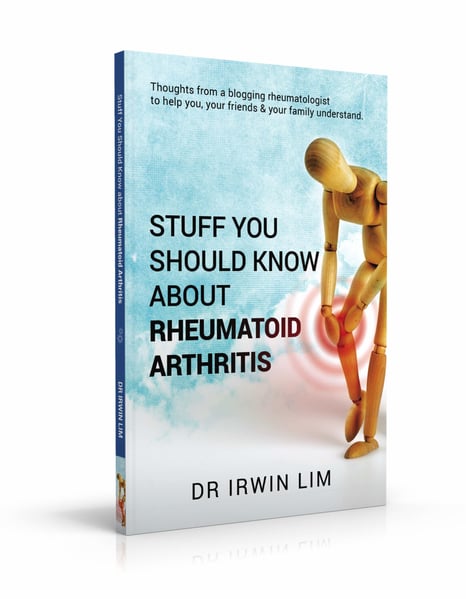I’ve written a book to help you understand Rheumatoid Arthritis

Every week, people with newly diagnosed rheumatoid arthritis present to our clinics. It’s a big deal for them. A chronic illness. Life changing.
There’s a window of opportunity to educate the person, to help them understand what might happen, to help them negotiate the next steps, to help them regain some control.
At BJC Health, we’ve put a lot of effort into trying to get this process better. We don’t have the magic answer, so it’s been a process of marginal gains, tweaking and refining.
I’ve really been thinking about a resource I could provide my patients to help understand rheumatoid arthritis. I don't feel that the current rheumatology association-produced information sheets are adequate for this goal. There is good information on the internet but people then need to sieve through it and work out what is most relevant for them, at this difficult stage of their disease.
Hence, the book on RA.
 Stuff you need to know about Rheumatoid Arthritis
Stuff you need to know about Rheumatoid Arthritis
(Thoughts from a blogging rheumatologist to help you, your friends & your family understand.)
It’s taken a year from concept to the current stage. The final version has been decided on. It’s with the publishers, being converted to electronic formats and also being prettied, so that we can move ahead with a limited print run.
I’m not sure how well it will be received and whether I’ve hit the mark. So, fingers crossed.
Here, I’d like to share with you the introduction to the book:
I started using social media to educate at the end of 2010. I was never sure how long I would continue but it’s become something that I’m unlikely to stop.
A clear benefit for me has been a much greater awareness of what those who have chronic arthritis, such as rheumatoid arthritis, experience. Uncertainty, frustration, various side effects, misunderstanding, and also importantly, hope.
It’s easy enough, and I have done this myself, to suggest that those people (doctors prefer the term patients), who use social media to discuss their problems, must be those who are not doing well or those who are “difficult”, needing somewhere to vent their frustrations.
Those people with rheumatoid arthritis who are doing well aren’t exactly spending a lot of time telling others how well they do. They just get on with their lives, don’t they?
I think there is truth in this. But there is a clear space and need for better communication, for people to learn more about their disease, for them to have resources to point their friends and family to, those people who are struggling to understand.
At the start of the journey, people do search for information. They may not actively engage in discussion but they’re reading and learning.
Unfortunately, most rheumatologists confine their contribution to patient education to the consultation rooms.
So people with rheumatoid arthritis upon searching online will often come across blogs from other people with rheumatoid arthritis who for whatever reason have decided to share their experience or to work as an advocate.
These are really useful. I do however feel that a physician’s voice is needed.
I’ve written many posts over the years dealing with rheumatoid arthritis. With this book, I’ve decided to collate these, and to flesh out some of these thoughts.
It’s not meant to be an authoritative textbook or a manual to explain every single symptom or every single possible side effect various medications may have. It certainly doesn’t replace the research I hope you’d be doing about this disease.
Rather, I see it as a starting point.
A resource to help you understand what your rheumatology team is thinking. And perhaps, one that will better help you appreciate aspects of rheumatoid arthritis so you can have better conversations about your management with family, friends and your health support team.

